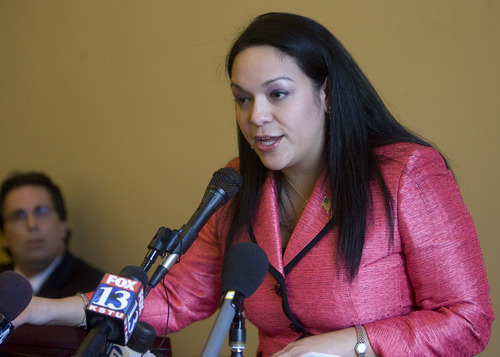This is an archived article that was published on sltrib.com in 2010, and information in the article may be outdated. It is provided only for personal research purposes and may not be reprinted.
Tony Yapias, director of Proyecto Utah and an outspoken critic of Rep. Stephen Sandstorm's enforcement-only immigration bill, said Wednesday he's not on board with Sen. Luz Robles' bill that would require permits for undocumented immigrants living in the state.
His chief concern is the bill's requirement of obtaining a federal waiver to operate.
"Senator Robles is well-intentioned, but we believe that her proposal will not work and is not practical," Yapias said. "None of the benefits provisions would work if the federal government does not grant authority."
The Robles bill would require undocumented immigrants living in Utah for longer than 18 months to obtain a permit upon getting a criminal-background check and enrolling in English classes — or proving proficiency in the language.
Once the permit is obtained, the undocumented immigrant could work, pay taxes and emerge from the shadows of society without fear of deportation. Robles estimates there are 110,000 undocumented immigrants in the state.
However, the bill requires obtaining a federal waiver to operate under its title, the Utah Pilot Accountability Permit Program Act. If a waiver is denied — as Yapias predicts — it would subject the state to lawsuits filed by the federal government.
Federal waivers can be notoriously long, difficult roads to navigate, said Ann Morse, program director of the Immigrant Policy Project program at the National Conference of State Legislatures.
In some cases, they are obtained. One of the high-profile successes was when Wisconsin Gov. Tommy Thompson received a waiver to run a welfare-reform program. Thompson's proposal ended up being the model for federal welfare reform signed by President Bill Clinton in 1996.
Morse said Colorado undertook the process in 2008, when it tried for a guest-worker program to aid its agriculture businesses that were desperate for employees. Two of the bill's chief sponsors and drafters were state Sen. Abel Tapia, D-Pueblo, and state Rep. Marsha Looper, R-Calhan.
Looper said the federal waiver requirement was written into the bill at the outset. It didn't take long to determine how difficult the process would be.
"The thing we learned was the federal government was very slow in terms of review and acceptance and trying to get the process done," Tapia said.
Morse said there was "a lot of revamping and reworking" of the bill.
"It went through several iterations," she said. "They hit a lot of brick walls."
And Looper said she discovered that as long as the bill enhanced federal law and didn't usurp it, a federal waiver wasn't needed in the bill, so she removed the requirement from it.
Looper said she was advised the federal government would never grant the waiver.
"It wouldn't happen," she said.
What Colorado has in place now is a law that allows farmers to hire independent agents to help them navigate the federal work-visa programs for workers from outside the United States.
Yapias, whose group focuses on the needs of the state's Latino immigrant community, said he appreciated the intention of Robles' bill, but he added that it runs counter to the first item in the Utah Compact, which states that immigration is a federal issue.
"If the federal government gives them a waiver, then I guess they'll have the last laugh," Yapias said. "But under the current climate, I don't think it's possible."
Paul Mero, president of The Sutherland Institute, said Tuesday that the bill — if passed by the Legislature and signed by Gov. Gary Herbert — would go forward with or without a federal waiver and that the state would deal with lawsuits.
Robles, who introduced her bill Tuesday at the Capitol, also said it would move forward.
Rep. Chris Herrod, R-Provo, an ally of Sandstrom, R-Orem, predicted the bill will go nowhere in Utah's conservative Legislature.
"To use Paul Mero's words, I think it's dead on arrival," Herrod said, referring to Mero's earlier reaction to the Sandstrom bill.





